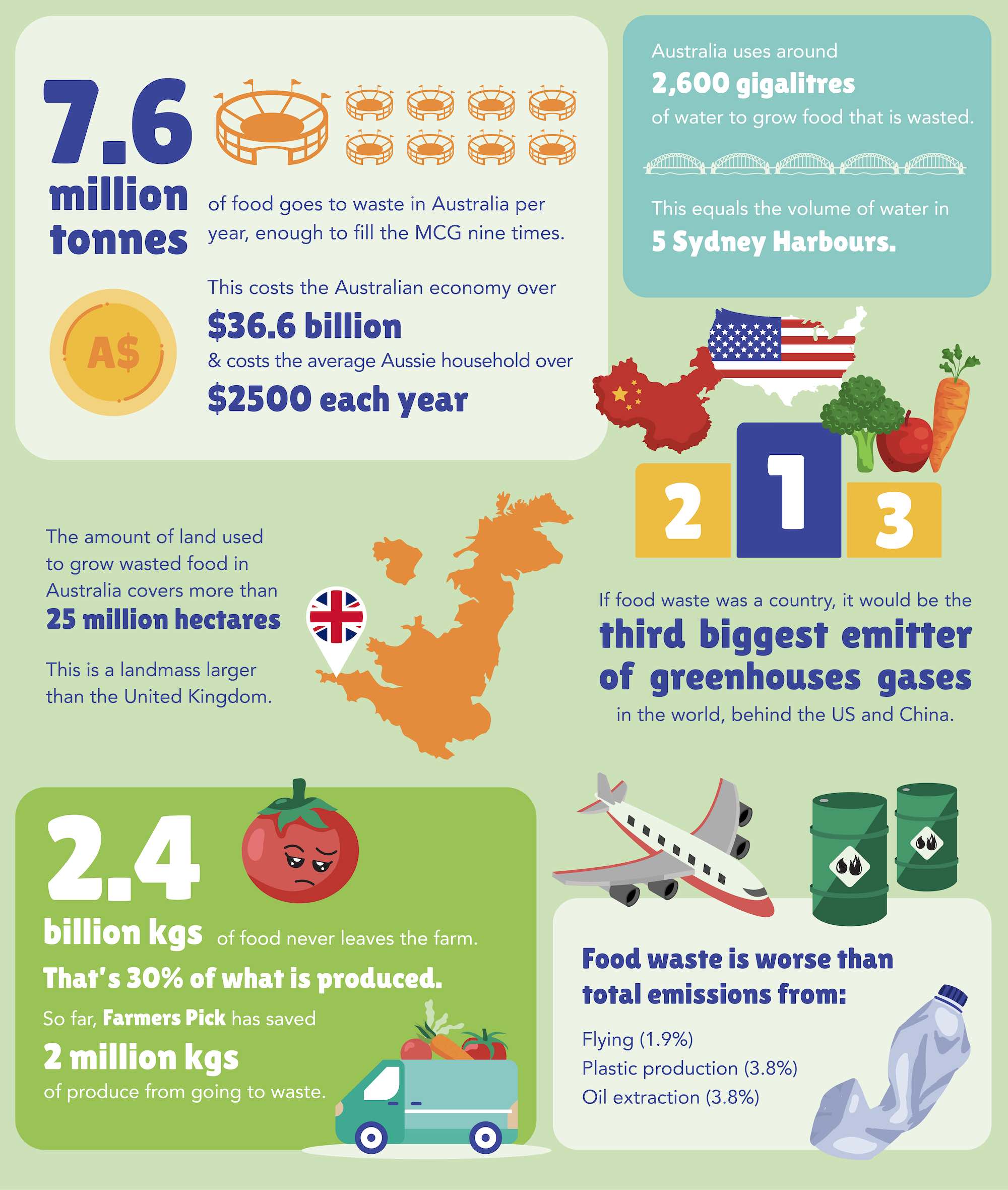Statistics of Ugly Fruit and Veg Food Wastage in Australia
In Australia, the issue of food wastage, particularly concerning ugly and imperfect fruits and vegetables, is more significant than most can imagine. The statistics paint a sobering picture, shedding light on the sheer magnitude of this problem and its wide impacts on our environment, economy, and everyday lives.

The Scale of Australia’s Food Wastage Problem
Every year, Australia grapples with the disheartening fact that a colossal 7.6 million tonnes of food, enough to fill the iconic Melbourne Cricket Ground nine times over, goes to waste (*1). This immense wastage carries an astronomical price tag, costing the Australian economy over $36.6 billion annually (*2), a huge financial burden on everyday households, especially in the midst of a cost of living crisis. On average, food waste costs households over $2,500 each year. (*3)
Surprisingly, the environmental toll of this food waste is more substantial than some of the activities often considered as major culprits. Food waste contributes an alarming 8.5% of Australia’s total greenhouse gas emissions (*4), surpassing the combined emissions from flying, plastic production, and oil extraction. If we were to classify global food waste as a nation, it would rank as the world’s third-largest emitter of greenhouse gases, trailing only behind the United States and China.
Food waste takes a considerable toll on our resources, namely our precious water. To grow food that eventually ends up in landfills, Australia consumes roughly 2,600 gigalitres of water (*5). This is enough water to fill five Sydney Harbours. What’s more, the land allocated for growing food that will never be consumed is more than 25 million hectares: an area larger than the entire United Kingdom. (*6)
Unrealistic Beauty Standards: Rejecting Ugly Fruit and Veg at the Supermarket
A critical piece of the puzzle lies out on our farms, with an astonishing 2.4 billion kilograms of food never leaving the farm due to supermarkets’ unrealistic beauty standards (*7). So-called ‘ugly’ fruits and vegetables are a huge contributing factor to food waste, with an astounding 30% of produce never leaving the farm gate (*8).
This wastefulness isn’t uniform; some fruits and vegetables suffer more than others. For example, over 50% of citrus produce is rejected, primarily because of their appearance, minor blemishes or size (*9). We think this is crazy, considering you don’t even eat the skin. When it comes to citrus, it truly is what’s on the inside that counts.
It’s easy We see the value in these perfectly imperfect fruits and veggies and proudly offer them in our ugly produce boxes for up to 30% cheaper than the supermarkets! Since we started, we have managed to save 2 million kilograms of produce from going to waste with the help of our amazing community of Australians across the eastern states!
Join Farmers Pick and Fight Against the Ugly Fruit and Veg Waste
The Australian statistics surrounding the waste of ugly fruits and veg are sobering. Food waste is a gigantic challenge for all Australians. Yet, each of us can play a part in solving this issue – and that includes a future where we embrace ugly fruits and vegetables.
If you want to learn more about imperfect produce, its effects, and how you can help combat food wastage, delve into our blog here.
By purchasing ‘ugly’ fruits and vegetables from Farmers Pick, you can join the fight against food waste and contribute to a more sustainable, cost-effective food system. So, join us on our fight against food waste and try a box of seasonal farm-fresh produce here.
Bibliography
*1, *2, *3, *5, *6 *7, *8, *9 FIAL (2021). National Food Waste Strategy Feasibility Study
*4 WRI: World GHG Emissions 2016 & https://www.nature.com/articles/s41558-019-0459-z